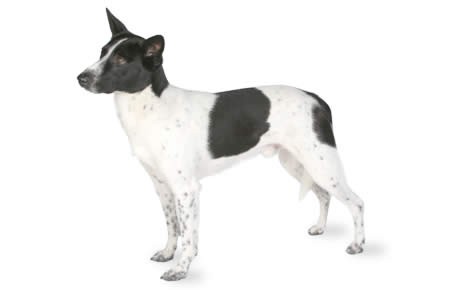Canaan Dog Breed Guide

Breed Group:
Herding Dogs
Get 30% off
Join our Newsletter
Sign Up Today
Canaan Background Info and History
The Canaan Dog, also called the Kelev K’naani, was developed from an ancient breed known as the pariah dog. Pariah dogs have existed for thousands of years and served as herders and guardians of the Israelites in biblical times. When the Israelites were forced out of their ancestral land, many pariah dogs became feral and occupied the Negev desert.
Millennia later, in 1930 Dr. Rudolphina Menzel developed the Canaan dog from this feral stock. The Canaan dog was bred to serve alongside the Israeli army and they were also trained to serve as guard dogs. Canaan Dogs are a medium-sized breed that still retains their deeply rooted canine instincts honed in the Negev desert. The Canaan Dog holds the distinction of being the national dog of Israel.
Canaan Temperament and Personality
Canaan Dogs are watchful, inquisitive, and alert. They possess exceptional sensory awareness and are vigilant in guarding what they consider their territory. They are exceptionally intelligent, quick to learn, and affectionate towards their family.
Canaan Training Tips
Canaan Dogs possess a high amount of intelligence that allows them to learn commands with relative ease. They require a patient owner and respond best in short training sessions. Early training and socialization is a must with this breed, as they tend to be very protective and suspicious of strangers if not properly socialized.
Canaan Exercise Needs
Canaan Dogs have a moderate amount of energy and will need two long walks per day as a minimum amount of exercise.
Lifespan of Canaans
Canaan Dogs live anywhere between 12-15 years.
Canaan Breed Popularity
The Canaan Dog is still relatively rare in the United States. This breed is currently the 181st most popular AKC registered breed.
Canaan Feeding Requirements
This breed needs a balanced diet that includes healthy fats and proteins and avoids any grain-based fillers. Canaan Dogs weigh between 35-55lbs., so feeding requirements will vary depending on the weight and energy level of your specific dog.
An average Canaan Dog will require between 1.5 to 2 cups of dry food a day, split into two even meals. Many Canaan Dog owners also report that their dogs excel on a raw food diet.
Canaan Grooming
Canaan Dogs are an easy breed to groom, and simply require weekly brushing to maintain a healthy coat.
Are Canaan Dogs Good With Kids?
Canaan Dogs are good with children and make excellent family pets so long as they are socialized from a young age. It is extremely important to socialize this breed with other pets, children, and adults so as to curb any overly protective behavior. They are regarded by Canaan Dog owners as very gentle with, and protective of, children.
Common Canaan Health Problems
Lymphosarcoma
Lymphosarcoma in dogs is a cancer that affects the lymph system. Specifically, the cancer affects a white blood cell called a lymphocyte, which is the major cell found in the lymph system.
Normal, healthy lymphocytes are part of the body’s immune system and are responsible for fighting infections or disease. When a lymphocyte turns cancerous it begins to attack normal, healthy tissue. Although lymphosarcoma can appear anywhere within the lymph system, the most general early symptom of lymphoma is a hardening and swelling of the lymph nodes.
Epilepsy
Epilepsy in dogs is a condition that is characterized by repeated seizures. These canine seizures can either be a symptom of an underlying medical condition, or symptomatic epilepsy or be occurring in the absence of any underlying medical condition, known as idiopathic epilepsy. In either case, most dogs suffer from what is known as tonic-clonic seizures, or seizures that result in full body motor movement such as thrashing of legs and are accompanied by a loss of consciousness.
Following a seizure, most dogs will experience a period of mental fatigue and may appear sluggish. For cases of symptomatic epilepsy, the condition is addressed by treating the underlying medical condition for which seizures are a symptom. In cases of idiopathic epilepsy, the condition is medically managed.
Progressive Retinal Atrophy (PRA)
PRA is a degenerative disease that affects the retina of the eye in dogs. The retina contains photoreceptor cells responsible for the eye’s ability to receive and perceive light. With PRA, these photoreceptor cells deteriorate over time.
The most common early sign of PRA is a diminished capacity to distinguish objects in low light. Your Canaan Dog may have trouble playing fetch at dawn or dusk or may bump into things at night. Over time this condition progresses to full blindness. PRA is a hereditary disease, so be sure to check with your breeder prior to adoption to determine if PRA runs in your dog’s line.
Hip Dysplasia
Canaan Dogs are prone towards developing hip dysplasia and should be tested by a veterinarian early to determine if they possess a loose hip assembly. Hip dysplasia in dogs is the result of an abnormally loose connection between the femur and the pelvic girdle. This loose connection causes uneven wear on the cartilage that pads both bones.
Over time, as this cartilage wears down, scar tissue and bone spurs can occur. Hip dysplasia typically presents in younger dogs as a loose hip assembly. In older dogs, the damage caused by hip dysplasia results in painful arthritis inhibited movement and eventually canine lameness.
Other Resources
National Breed Website: The Canaan Dog Club of America
Rescue: Canaan Dog Rescue Network





